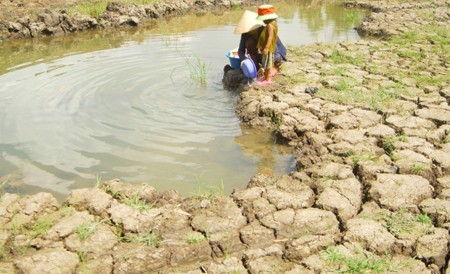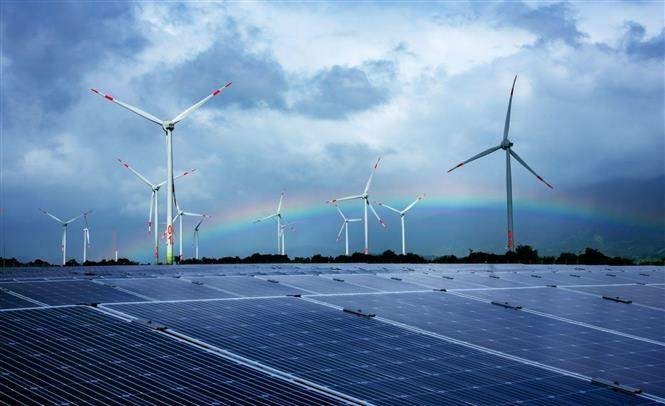
Vietnam to ‘kill two birds with one stone' method in response to climate change
Latest
 |
| About 5% of land area in the Mekong Delta region may vanish due to climate change. (Source: VNA) |
Severe consequences
The National Report on Country Climate and Development for Vietnam, published by the World Bank (WB) in mid-July, revealed that Vietnam is increasingly experiencing the impacts of climate change on national development and now having to find solutions to issues caused by climate change.
After more than 2 decades of stable growth, Vietnam has set an ambitious goal of achieving a high income by 2045.
According to the Socio-Economic Development Strategy for the 2021-2030 period, the country's economic transformation will depend heavily on the effective management of natural capital resources, including large reserves of agricultural resources, forests and minerals, which have pushed up the development in Vietnam.
However, possessing more than 3,200km of coastline with many low-lying cities and riverside plains, Vietnam is one of the most vulnerable countries in the world to climate change.
The impacts of climate change, mainly from temperature and sea level rise, have been disrupting economic activities and weakening growth. Initial calculations showed that Vietnam would lose 10 billion USD in 2020, equivalent to 3.2% of GDP due to the impact of climate change.
Without appropriate mitigation and adaptation measures, it is estimated that climate change will cost Vietnam about 12-14.5% of GDP per year by 2050 and could push 400,000-1 million people into extreme poverty in 2030.
According to the “Climate change in Vietnam: Impact and Adaptation” Report (resulting from the Vietnam GEMMES Program that has been conducted since 2018 under the Memorandum of Understanding between the Department of Climate Change and the French Development Agency (AFD)), Vietnam could lose 5% of its land area in the Mekong Delta in the scenario of increased temperature and sea level rise by 1 meter.
When the global temperature rises to 1.5ºC and 2ºC, Vietnam's GDP will lose 4.5% and 6.7% respectively. The total cost caused by climate change could reach 523 billion USD by 2050.
Climate change is a really formidable and serious challenge for Vietnam.
Which way to respond?
At the 26th Conference of the Parties to the United Nations Framework Convention on Climate Change (COP26) taking place in November 2021 in Glasgow, UK, Prime Minister Pham Minh Chinh announced Vietnam's commitment to achieve net zero emissions by 2050.
Immediately after COP26, Vietnam was very active, responsible, urgently concretized, and immediately started implementing its commitments.
The Government has established the National Steering Committee to implement Vietnam's commitments, led by the Prime Minister. Relevant ministries and agencies have focused on developing strategies, programs and action plans to realize commitments.
 |
| In response to climate change, Vietnam will focus on developing an industry of energy transformation and researching its technology, and promoting the production of domestic equipment. (Source: VNA) |
At the 3rd meeting of the Steering Committee (July 14th), Prime Minister Pham Minh Chinh stated: “One of the important tasks is to focus on developing an industry of energy transformation and its technology research, promoting the production of domestic equipment…. This is to ‘kill two birds with one stone', when we can both realize our international commitments and develop our capability and technology in the industry sector that has a huge potential in domestic and foreign market.”
As estimated by the World Bank, from now to 2040, the need for additional investment in climate change adaptation and mitigation measures in Vietnam could reach about 6.8% of GDP per year, equivalent to 368 billion USD.
From an expert perspective, Alfonso Garcia Mora, Vice President of the Asia-Pacific region of the International Finance Corporation (IFC), a WB member, affirms that Vietnam will need to prioritize greening the financial sector, promoting green growth projects across many sectors, and promulgate transparent and predictable procedures for energy projects.
From a government agency’s point of view, Minister of Natural Resources and Environment Tran Hong Ha said that the key to solving the consequences of climate change is the application of science and technology.
"So, in the coming time, it is necessary to speed up research and application of scientific and technical advances in responding to climate change, contributing to the development of a low-carbon and circular economy", the Minister stressed.
The Ministry of Science and Technology has coordinated with the Ministry of Natural Resources and Environment to implement the Science and Technology Program to respond to climate change and manage natural resources and the environment for the 2016-2020 period.
Through the program, the agencies have built and developed a system to monitor climate change and mitigate greenhouse gas emissions suitable to Vietnam's conditions; and solve problems related to saline intrusion (in various types of soil, plants, forests, etc.).
In addition, the program also sets up economic models adapted to extreme natural disasters and economic models to cope with saline intrusion.
Moreover, the program contributes to the development of human resources in response to climate change by training 99 masters and supporting 48 doctoral training, enhancing capability for thousands of scientific researchers.
Many experts note that, with the Paris Agreement, Vietnam can take advantage of the opportunity to receive necessary resources from international organizations, FDI providers, multilateral financial institutions, and remittance sources to support greener and cleaner action.
However, the realization of Vietnam's committed goals at COP26 requires determination and great efforts and the mobilization of all resources of the whole society and people. In particular, the connection and mobilization of resources from the world, green financial flows, technology transfer, knowledge and experience of countries and international organizations are very important.
| WB recommends 5 priorities for Vietnam to respond to climate change as follows: Firstly, a program at regional level for the Mekong Delta region, limiting sand mining and groundwater extraction, investing in more facilities and strengthening regional coordination, etc. Secondly, an integrated plan to protect coastal municipalities and connect traffic to avoid negative impacts from acute weather; upgrading road and energy systems, strengthening risk management and early warning systems. Thirdly, a program to reduce air pollution around Hanoi. Fourthly, speeding up the transition to renewable energy by improving the legal framework. Fifthly, expanding social security to compensate for the most vulnerable people who will be affected by the measures to deal with climate change. |

















